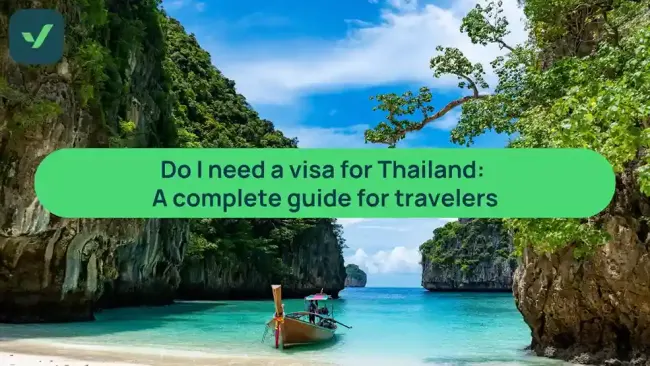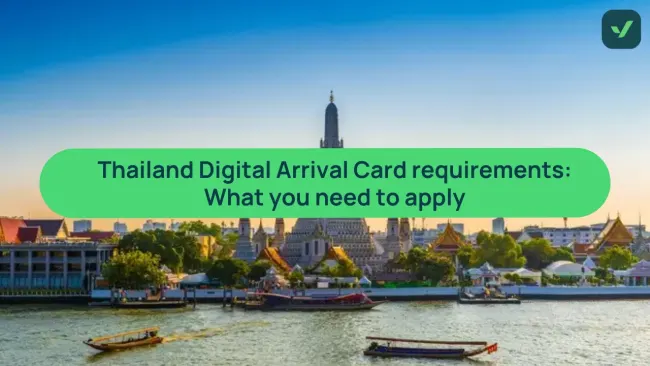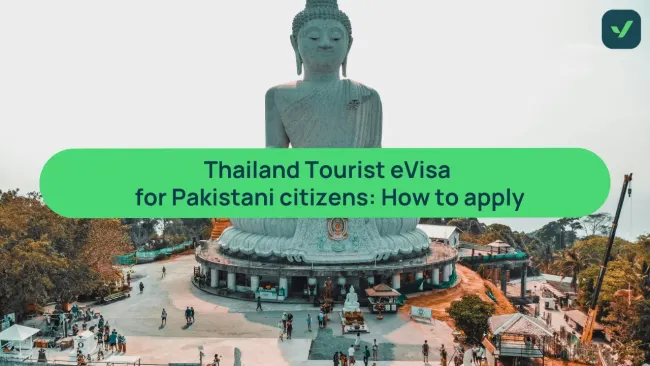
Thailand Visa: Entry requirements and travel information for Thailand
Welcome to Thailand
Planning a trip to the Land of Smiles? Find out which types of visas you may need and how to easily apply for one. With us, you can concentrate on getting excited about your trip instead of worrying about the paperwork.

What's a Thailand Tourist Visa, and who's it for?
Who's the Thailand Tourist Visa for? Travelers from countries that don't have visa exemption agreements with Thailand and who wish to visit for tourism purposes.
Who isn't eligible for a Thailand Tourist Visa? Individuals from countries with visa exemptions or visa-on-arrival agreements with Thailand and those seeking employment, study, or residence in Thailand aren't eligible for this visa.
What's the purpose of a Thailand Tourist Visa? The Thailand Tourist Visa is designed to welcome travelers who wish to visit Thailand for the following reasons:
-
Tourism: Explore Thailand's rich culture, breathtaking landscapes, and vibrant cities.
-
Visiting friends or family: Stay with loved ones in Thailand.
-
Participating in Recreational Courses: Take short cooking, yoga, or diving courses, provided they stay within the visa period.
How long can you stay with a Thailand Tourist Visa?
This visa typically allows a stay of up to 60 days per entry, which can be extended for another 30 days at the discretion of the Thai Immigration Bureau.
To increase your chances of a smooth application process, ensure your documentation is thorough and accurate. Explore our resources, including a Visa Checker Tool, to verify your eligibility and prepare effectively.
What's the Thailand eVOA, and who's it for?
Who's the Thailand eVOA for? Travelers from eligible countries who seek a fast and convenient way to obtain authorization to travel to Thailand for short visits.
Who isn't eligible for the Thailand eVOA? Citizens of countries not on the eVOA eligible list, individuals planning to work, study, or reside in Thailand, or those visiting for purposes other than tourism.
What's the purpose of the Thailand eVOA? The Thailand eVOA (Electronic Visa on Arrival) facilitates quick entry into Thailand for:
-
Tourism: Experience the wonders of Thailand, from its islands to historical sites.
-
Transit: Passing through Thailand en route to another destination.
-
Short-term business activities: Attending meetings or conferences without taking up employment.
How long can you stay with the Thailand eVOA? The eVOA allows for a stay of up to 15 days per entry into Thailand.

Thailand long-term visa options and who they're for
Thailand offers a range of long-term visa options catering to various individuals, including retirees, investors, professionals, and families. Here are the main categories:
-
Long-Term Resident (LTR) Visa: Targets wealthy global citizens, retirees, remote workers, and highly skilled professionals. It comes with benefits like no annual visa extension, airport fast track, and eligibility to work in Thailand. There are specific financial and professional criteria for eligibility.
-
Thailand Elite Visa: Designed for affluent visitors, investors, and expats, offering a 5-year renewable stay, multiple entries, and additional perks. It simplifies long-term residency without frequent immigration visits.
-
Business Visa (Non-Immigrant “B” Visa): For those engaged in business activities or employment in Thailand, requiring Thai company sponsorship or business ownership in Thailand.
-
Retirement Visa (Non-Immigrant “O” Visa based on Retirement): Available to those over 50, meeting health insurance and financial criteria, allowing for a peaceful retirement in Thailand.
-
Marriage Visa (Non-Immigrant “O” Visa based on Marriage): For individuals married to Thai nationals, provided financial stability and genuine relationship evidence.
Each of these visas has its requirements, benefits, and application processes tailored to the needs of individuals wishing to reside in Thailand for an extended period.
For more detailed information and guidance on eligibility and application procedures, visit the official Thai Board of Investment website for LTR Visa and [ThaiEmbassy.com for other visas] (https://www.thaiembassy.com/). Unfortunately, we currently don't offer these visas, but these resources can provide valuable insights.

Staying healthy in Thailand: Essential health guidelines for travelers
Planning a visit to Thailand? It's crucial to be informed about health guidelines to ensure a worry-free journey. Here's what travelers should know.
Stay informed about routine and recommended vaccines
-
Keep updated with Thailand's COVID-19 entry requirements, including quarantine, testing, or vaccine certificates. Check the latest guidelines with your airline or Thailand's Ministry of Public Health.
-
Vaccinations for diseases such as Hepatitis A and B, Typhoid, and Tetanus are recommended for travelers to Thailand. Vaccines for Japanese Encephalitis and Rabies may also be advised depending on your travel plans. For detailed information, consult the CDC's Travelers' Health page for Thailand.
Medical facilities
-
Thailand boasts high-quality medical facilities, especially in major cities like Bangkok, Chiang Mai, and Phuket, where many hospitals cater to international patients.
-
In rural areas, access to medical facilities may be more limited. It's advisable to know the location of the nearest hospital or clinic to your destination.
-
Medical treatment in Thailand can be less expensive than in the U.S., but it's still important to have travel health insurance that covers medical expenses in Thailand. Ensure your insurance plan includes medical evacuation.
-
Pharmacies are widely available, but carrying a supply of any prescribed medications in their original packaging and a doctor's prescription is recommended.
Health Insurance
-
Securing health insurance before traveling to Thailand is crucial. Opt for a plan that offers high coverage limits for medical care.
-
Verify your insurance coverage for international travel and the activities you plan to undertake. Consider policies that include:
-
Trip cancellation, delay, and interruption benefits.
-
Coverage for medical expenses and medical evacuation.
-
Baggage coverage.
Things to be aware of when visiting Thailand
-
Climate: Thailand's tropical climate requires precautions against dehydration and heat-related illnesses. Always stay hydrated and use sun protection.
-
Mosquito-borne diseases: Use insect repellent and wear long sleeves to protect yourself against mosquito bites that can carry diseases like Dengue Fever, Zika, and Malaria.
-
Street food safety: Thai street food is a must-try, but choose busy stalls and where the food is cooked to reduce the risk of foodborne illnesses.
-
Local customs and etiquette: Respect Thai customs, such as removing shoes before entering someone's home or a temple, and be mindful of the laws against disrespecting the Thai Royal Family.
-
Water safety: Drink bottled or filtered water, as tap water isn't safe to drink. Be cautious when swimming in oceans or rivers due to strong currents or unseen hazards.
-
Traffic safety: Traffic can be chaotic, and road rules are often ignored. Exercise caution when crossing streets, and if renting scooters or motorcycles, always wear a helmet and ensure you're legally allowed to drive them.
Traveling with medication for personal use
-
Declare all medications: Inform Thai customs about personal medications upon entry into the country.
-
Keep the original packaging: Medications should remain in their original containers. Carry them in your hand luggage, if possible.
-
Carry a prescription or doctor's letter: Documentation must be in English and verify why you need the medication.
-
Verify legality: Before departure, check that your medications are legal in Thailand by contacting the nearest Thai embassy or consulate.
-
Quantity in line with stay: Only bring a reasonable amount of medication for the length of your visit to avoid misunderstandings.

 Australia ETA Online
Australia ETA Online
 United Kingdom ETA
United Kingdom ETA
 India Tourist eVisa
India Tourist eVisa
 Canada ETA Visa
Canada ETA Visa
 Turkey eVisa
Turkey eVisa
 Egypt eVisa
Egypt eVisa
 Singapore SG Arrival Card
Singapore SG Arrival Card
 Indonesia eVoa Visa
Indonesia eVoa Visa
 Aruba ED Card
Aruba ED Card


